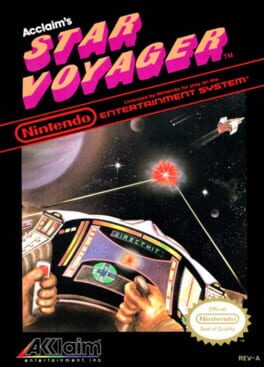Insofar as the eternal silence of infinite space can frighten the voyager, the firmament has never ceased to be the object of human dreams. Science fiction has taken up the theme since antiquity, as in Lucian of Samosate's Verae Historiae. In contemporary Japan, the exploration of science fiction has been a mixture of traditional influences and ideas from the West. A fringe of cultural productions embraced the melancholy of Japanese society, resulting in works such as Nippon Chinbotsu (1973), Uchū Senkan Yamato (1974) or Captain Future (1978), to name but a few. Star Voyager seems to stand in this lineage, at the intersection between space heroism and the melancholy of infinity: this resonates in the title theme, remarkable for its time. The track opens with a catchy melody, before modulating into a sadder theme and culminating in a painful cry from the RP2A03's audio chip, before returning to the theme A. It is reminiscent of the contemplative tracks of Uchū Senkan Yamato.
Inspired by the Star Trek series (1966) and especially the Star Raiders game (1980), Star Voyager is an ambitious mix between the simulation and the first person game genres. The attempt is not new on the Nintendo hardware, since Namco had already tried it with Star Luster (1985) with mixed success. Critics point out that it is too obtuse and complex for the NES. Star Voyager, ironically, suffers from the same problems. The title allows you to play as a pilot of the CosmoStation Noah, whose goal is to defend the mothership from the attack of the Molok Wardrivers, a kind of space terrorists. The game is played in the first person and consists of setting up a flight path towards the enemy squads to destroy them, while managing the resources of the aircraft (shield, fuel). The strategic aspect comes in the fact that the two factions start on opposite sides of the map, creating tension for resources and upgrades in the middle of the map: too slow and the planets will be destroyed along with the precious bombs and repairs. The idea could work, if the title wasn't so cryptic about the objectives and the interface so unclear, despite a rather charming aesthetic. Combat also remains disappointing, as it is so difficult to control the device: the title quickly becomes a race against time to allied stations to recharge, between unreadable dogfights.
More generally, Star Voyager fails to emulate what made Star Raiders so charming. The aft view is gone, making it harder to track enemies and the interface is generally less readable. Above all, while progress has been made on emulation the movement of the stars, the title lacks clear innovation. Though it is unfortunate, Star Voyager remains a love letter to space exploration, in the purest sense of the word. Maybe not the most accessible game of all, but still charming: nonetheless, it's hard to recommend it to anyone, due to the sharp difficulty. Pascal's quote about the 'eternal silence of infinite space' is well known. Scholars may also want to quote his 'Disproportion of Man' in Transition No. 4: 'I believe that his [man's] curiosity being changed into admiration he will be more disposed to contemplate them [the marvels of existence] in silence than to seek them with presumption.' For what is worth, I do, Star Voyager.
Inspired by the Star Trek series (1966) and especially the Star Raiders game (1980), Star Voyager is an ambitious mix between the simulation and the first person game genres. The attempt is not new on the Nintendo hardware, since Namco had already tried it with Star Luster (1985) with mixed success. Critics point out that it is too obtuse and complex for the NES. Star Voyager, ironically, suffers from the same problems. The title allows you to play as a pilot of the CosmoStation Noah, whose goal is to defend the mothership from the attack of the Molok Wardrivers, a kind of space terrorists. The game is played in the first person and consists of setting up a flight path towards the enemy squads to destroy them, while managing the resources of the aircraft (shield, fuel). The strategic aspect comes in the fact that the two factions start on opposite sides of the map, creating tension for resources and upgrades in the middle of the map: too slow and the planets will be destroyed along with the precious bombs and repairs. The idea could work, if the title wasn't so cryptic about the objectives and the interface so unclear, despite a rather charming aesthetic. Combat also remains disappointing, as it is so difficult to control the device: the title quickly becomes a race against time to allied stations to recharge, between unreadable dogfights.
More generally, Star Voyager fails to emulate what made Star Raiders so charming. The aft view is gone, making it harder to track enemies and the interface is generally less readable. Above all, while progress has been made on emulation the movement of the stars, the title lacks clear innovation. Though it is unfortunate, Star Voyager remains a love letter to space exploration, in the purest sense of the word. Maybe not the most accessible game of all, but still charming: nonetheless, it's hard to recommend it to anyone, due to the sharp difficulty. Pascal's quote about the 'eternal silence of infinite space' is well known. Scholars may also want to quote his 'Disproportion of Man' in Transition No. 4: 'I believe that his [man's] curiosity being changed into admiration he will be more disposed to contemplate them [the marvels of existence] in silence than to seek them with presumption.' For what is worth, I do, Star Voyager.
